|
Spring at Grazer Kunstverein
10 March – 9 June 2017
Eröffnung: Freitag 10. März, 18 Uhr
New and Extended Commissions:
Céline Condorelli
Chris Evans with Morten Norbye Halvorsen
Fiona Hallinan
On Display:
Isabella Kohlhuber
Isabel Nolan
Adam Zagajewski
On Reflection:
Ernst Fischer
Art has long been the dysfunctional holding space for thought. Objects identifiable for their potential use, thwarted. A familiar thing presenting itself as what it is, only to reveal that it isn’t. Throughout 2017 the Grazer Kunstverein is occupied with unraveling thoughts around tools and magic, use and necessity, work and power, as explored in The Necessity of Art, written in 1959 by the brilliant and almost forgotten Ernst Fischer.
Through artistic practice, we investigate Fischer’s claim that art is not only necessary in order to make it possible for humanity to recognise and change the world, but that art is also necessary by virtue of the magic inherent within it. Credited with the slogan “Art must do nothing, yet can do everything” Fischer acts as our spirit guide for the development of a year-long programme of new commissions, evolving conversations, and on-going research collaborations, all dedicated to or inspired by the question of the necessity of art.
Less concerned with “art in the service of . . .” and more convinced by “art as the potential for . . .” the programme reflects a commitment to performativity through language, meaning and enactment. Each season builds, evolves and blends works, positions, and practices in an accumulative gesture that questions the role and function of a kunstverein in times of deep uncertainty about what art is, does, or can do. As poet Adam Zagajewski asks, why is art silent when terrible things happen? And terrible things happen every day.
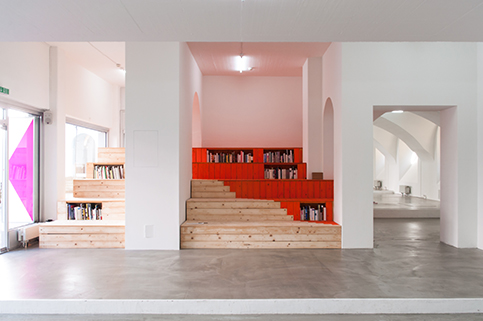
Céline Condorelli, Things That Go Without Saying, 2013, extended commission for Spring 2017, Grazer Kunstverein. Photography by Christine Winkler.
Céline Condorelli
Things That Go Without Saying, 2013–2020
In 2013 Céline Condorelli was commissioned by former director Krist Gruijthuijsen to produce a new work for the Grazer Kunstverein as part of The Members Library. The outcome was Things That Go Without Saying, realised in collaboration with Harry Thaler.
The structure operates at a scale between furniture and architecture, and has become truly the heart of the building. It currently houses over 200 books, each of which have been selected for inclusion by our members. In adapting the work for the new artistic programme, Things That Go Without Saying is mirrored by Fink’s library of tastes, and takes on a bright new hue. The library (of books) will continue to grow, as the structure continues to host or support newly commissioned work by other artists.
Commissioned in 2013 by the Grazer Kunstverein
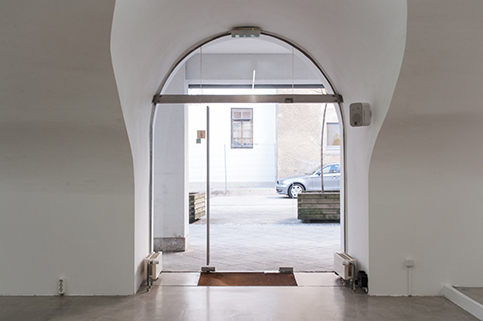
Chris Evans with Morten Norbye Halvorsen, Jingle, new commission for Spring 2017, Grazer Kunstverein. Photography by Christine Winkler.
Chris Evans
in collaboration with Morten Norbye Halvorsen
Jingle, 2017–2020
Chris Evans, in collaboration with Morten Norbye Halvorsen, has produced a jingle for the six entrance doors of the Grazer Kunstverein, set to cumulatively proclaim and broadcast the arrival of each visitor. The composition incorporates a Shepard scale – a sequence of notes arranged to give the auditory illusion of an ascending or descending scale, while remaining ultimately unchanged in their pitch range. It also includes remnants of the song ‘Ain’t Gonna Feel’ by Austrian band, ‘Supermax’, whose popularity peaked in the 1970’s.
Commissioned in 2017 by the Grazer Kunstverein
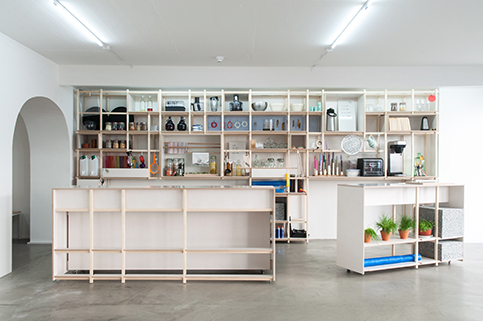
Fiona Hallinan, Fink’s, new commission for Spring 2017, Grazer Kunstverein. Photography by Christine Winkler.
Fiona Hallinan
Fink’s, 2017–2020
Bar designed and built by Studio Magic and Brauchst Collective
Fink’s is a library of tastes. Set in the reception area of the gallery, it is an ongoing, collaborative artwork developed by Fiona Hallinan in conversation with the many producers, makers and growers of Graz and the surrounding area. Designed to replicate the aesthetics of a café, Fink’s functions as a threshold, a welcoming space for conversations about art and the world, a repository of tastes, recipes and memories, and a holistic space for dreaming and scheming. It operates principally on the basis of meaningful exchange with members of the Grazer Kunstverein. Fink’s exists in two states: active and dormant.
Commissioned in 2017 by the Grazer Kunstverein
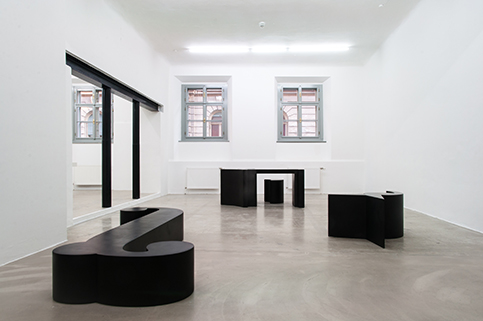
Isabella Kohlhuber, Space for an Agreement, 2016, on display for Spring 2017, Grazer Kunstverein. Photography by Christine Winkler.
Isabella Kohlhuber
Space for an Agreement, 2016
Isabella Kohlhuber’s practice engages with typography as a form of thought process. Her work Space for an Agreement interrupts the conventional readings of an artwork, in both its formal sculptural presence and its potential functionality. This work will accompany us through our year-long programme, exploring the necessity of art in the in-between space of form and function.
Courtesy of the artist and Galleria Doris Ghetta
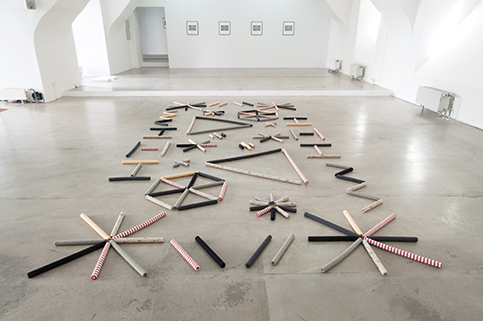
Isabel Nolan, The Provisory Rug, adaptable for past, present and future. (For Marie Lieb), 2012, on display for Spring 2017, Grazer Kunstverein. Kindly on loan from Ernst Siegel Collection, Vermont, USA. Photography by Christine Winkler.
Isabel Nolan
The Provisory Rug, adaptable for past, present and future. (For Marie Lieb), 2012
Inspired initially by the unusual actions of a woman in a room in Heidelberg in 1894, Isabel Nolan’s sculptural floor piece takes on many different forms and dedications. This disobliging carpet accompanies us in various configurations throughout our 2017 programme. The first iteration is titled Spare Rug for Marie Lieb’s room, Heidelberg Psychiatric Hospital, 1894 (a.k.a. Circumstances shape an emptiness), 2012. Photographs of Marie Lieb’s original work are reproduced with special thanks to the Prinzhorn Collection, University Hospital, Heidelberg.
Courtesy of the Kerlin Gallery and Ernst Siegel Collection, Vermont, USA
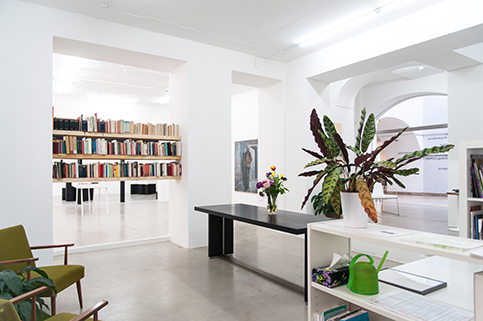
View of studio, Spring 2017, Grazer Kunstverein. Photography by Christine Winkler.
Adam Zagajewski
We Know What Art Is, 2013
Adam Zagajewski is a poet, novelist, translator and essayist. He first became well known as one of the leading poets of the Generation of ‘68’ or the Polish New Wave (Nowa fala); today he is one of Poland’s most well known contemporary poets. Now part of our year-long programme, this poem, which exists ephemerally on the tips of tongues, first appeared in English in issue 136 of The Threepenny Review in Winter 2014.
Courtesy of the author Adam Zagajewski and translator Renate Schmidgall
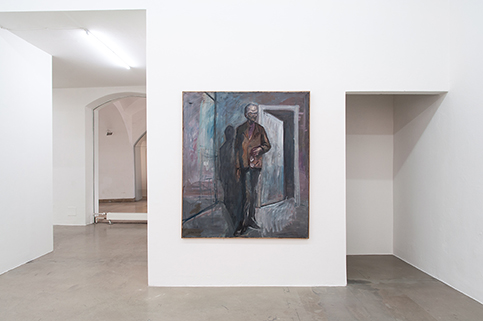
Georg Eisler, Ernst Fischer, 1972/73, on display for Spring 2017, Grazer Kunstverein. Kindly on loan from Ernest Kaltenegger. Photography by Christine Winkler.
Ernst Fischer (b. 1899, Komotau, Bohemia, d. 1972 Deutschfeistritz, Austria) was a journalist, writer, politician and author of ‘The Necessity of Art’.
He studied philosophy in Graz, and was credited as a dramatist during the 1920’s in Vienna. He is cited as asserting the slogan “Art must do nothing, yet can do everything”* In the mid-thirties, having become convinced that only communism could halt the rise of fascism, Fischer went to Moscow from where he embarked on a long and turbulent political career. One of Fischer’s most fascinating aspects is his capacity for self-reflection, as articulated in an essay titled ‘Was that Me?’ featured in An Opposing Man (first published in 1974). His cultural legacy can be gleaned from the ideas expressed within ‘The Necessity of Art’, which will be explored through a series of reading groups, lectures, presentations and discussions throughout the year at the Grazer Kunstverein. To this end we are undertaking new research collaborations with a range of institutions and initiatives, from Graz, Vienna, and beyond.
Georg Eisler
Ernst Fischer, 1972/73
On display at the Grazer Kunstverein until 20 March 2017, kindly on loan from Ernest Kaltenegger.
Grazer Kunstverein would like to thank Marina Fischer-Kowalski, Gabriel Hirnthaler of Prenning’s Garten, Eugen Gross, Heimo Halbrainer, Ernest Kaltenegger, Literature Archive in Vienna, Institute of Contemporary History for their kind input into research and insights on Ernst Fischer.
*Rabinbach, Anson G., Passage to Politics: Ernst Fischer as Critic, Writer and Dramatist in the 1920’s, Modern Austrian Literature, Bd. 8, No. 3/4, 1975
The presentation of work by Isabel Nolan and Fiona Hallinan is kindly supported by Culture Ireland.
|
![]()
![]()